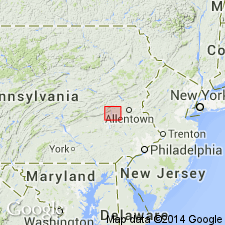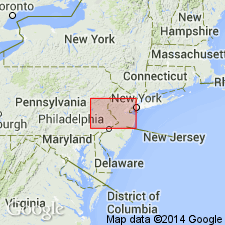
- Usage in publication:
-
- Moselem Member*
- Modifications:
-
- Named
- Biostratigraphic dating
- Dominant lithology:
-
- Mudstone
- Shale
- AAPG geologic province:
-
- Appalachian basin
Summary:
The Moselem Member of the Virginville Formation is here named in the Richmond slice of the Hamburg klippe in PA. It consists of cleaved black and green mudstone and shale with variable amounts of carbonate rock. Tectonically underlies the Sacony and Onyx Cave Members of the Virginville. Thickness is 230 m. Age is Late Cambrian to late Early Ordovician based on conodonts.
Source: GNU records (USGS DDS-6; Reston GNULEX).

- Usage in publication:
-
- Moselem Member*
- Modifications:
-
- Age modified
- Biostratigraphic dating
- AAPG geologic province:
-
- Appalachian basin
Summary:
Age of the Moselem Member is Middle Ordovician. It contains Middle Ordovician fossils and tectonically underlies the Late Cambrian Onyx Cave Member of the Virginville Formation. Age of the Virginville Formation is Late Cambrian and Middle Ordovician. The lower Sacony Member, like the Onyx Cave is Late Cambrian. Lower Ordovician strata appear to be missing.
Source: GNU records (USGS DDS-6; Reston GNULEX).
For more information, please contact Nancy Stamm, Geologic Names Committee Secretary.
Asterisk (*) indicates published by U.S. Geological Survey authors.
"No current usage" (†) implies that a name has been abandoned or has fallen into disuse. Former usage and, if known, replacement name given in parentheses ( ).
Slash (/) indicates name conflicts with nomenclatural guidelines (CSN, 1933; ACSN, 1961, 1970; NACSN, 1983, 2005, 2021). May be explained within brackets ([ ]).

